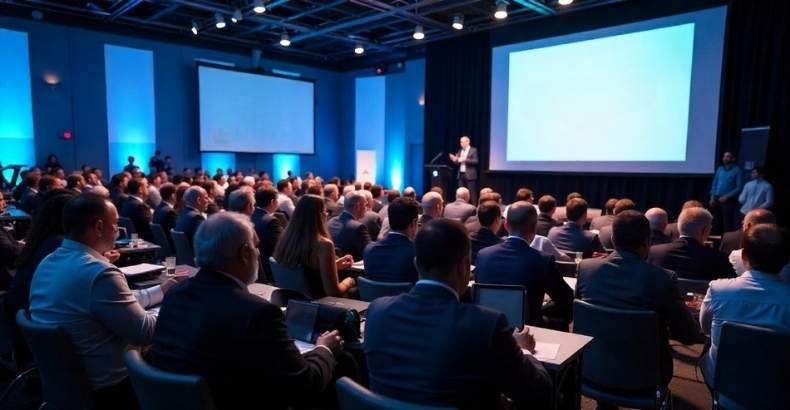With the highly competitive market of business at present, conferences serve as vital networking opportunities for professionals across various industries. These events provide an excellent platform for sharing knowledge, discussing trends, and building connections with peers. If you’re new to this field, one question you might ask: How to attend a business conference for the first time?
To effectively attend your first conference, start by researching the event and its agenda. Familiarize yourself with the speakers, topics, and networking opportunities available. Prepare the necessary materials like business cards and a notepad for notes. Dressing professionally and having a clear plan will help you feel more confident during the event.
Would you like to know what makes a conference experience successful? Keep reading this article to find all the essential tips and insights that will guide you through every step, ensuring you make the most of the event!
Why is Attending a Business Conference Important?
The purpose of a business conference is to improve the skills and knowledge of professionals. These events offer a great opportunity to learn from industry experts and gain insights into the latest trends and best practices. Conferences often feature keynote speakers who are leaders in their fields, providing valuable information that can be applied directly to your work.

Networking is another crucial aspect of business conferences. Meeting other professionals allows you to build meaningful connections that can lead to collaborations and partnerships. Engaging with peers can also provide support and inspiration as you deal with challenges in your career, promoting a sense of community within your industry.
Moreover, conferences provide access to a wealth of resources, including workshops, panel discussions, and networking events. Participants can engage in hands-on learning experiences that deepen their knowledge of complex topics. This access to various formats ensures that attendees find something valuable, regardless of their preferred learning style.
For those interested in expanding their global perspective, attending international business conferences in Canada can be particularly beneficial. These events attract professionals from diverse backgrounds and industries, enriching the networking experience. By participating in such conferences, you can broaden your knowledge and gain insights that are essential for learning about the global business sector.
What to Consider Before Attending a Business Conference?
Attending a business conference can be a transformative experience for your career. With careful preparation, you can maximize the benefits of the event. Make the most of your time and investment at the conference by identifying key considerations.
Define Your Objectives
Before attending, clearly define your objectives. Identify what you hope to achieve, whether it’s networking, learning new skills, or gaining insights into industry trends. Having specific goals will help you stay focused and make the most of the sessions and networking opportunities available at the conference. When you know what you want to accomplish, you can optimize your experience accordingly.
Research the Agenda
Take time to review the conference agenda in detail. Look for sessions that align with your interests and goals. Pay attention to the speakers and topics, as they can significantly influence the value you gain from the event. A well-structured agenda with relevant content will maximize your learning experience and keep you engaged throughout the conference.
Networking Opportunities
Consider the networking opportunities that the conference provides. Networking is one of the primary benefits of attending a business conference. Look for events that encourage interactions, such as breakout sessions, workshops, and informal gatherings. Engaging with other attendees can lead to valuable connections that may benefit your career long after the conference ends.
Prepare for Participation
Your conference experience will be improved if you prepare well. Bring necessary materials, such as business cards, notebooks, and any specific documents you may need. Familiarize yourself with the venue and the schedule to ensure you can participate in the event smoothly. Being well-prepared will allow you to focus on engaging with others and absorbing the information presented.
Budget Considerations
Analyze the costs associated with attending the conference. This includes registration fees, travel expenses, accommodations, and meals. Create a budget that reflects these costs and ensure that it aligns with your financial situation. Being mindful of your budget will help you make informed decisions about your attendance and maximize the value of your investment.
Before attending a business conference, you should consider your objectives, research the agenda, explore networking opportunities, prepare for participation, and determine your budget. By taking these factors into account, you can maximize your experience and achieve meaningful outcomes.
How to Attend a Business Conference for the First Time?
If you are attending a business conference for the first time, you may feel both excited and nervous. With the right preparation, you can make the most of this opportunity to learn and connect with other professionals. Here’s a guide to help you manage your first experience successfully.

Research the Conference
Begin by thoroughly researching the conference you plan to attend. Look for detailed information about the speakers, topics, and overall agenda to ensure you’re selecting the right business conference to attend. By knowing what to expect, you can ease any anxiety and prepare thoughtful questions or topics for discussion with others. This preparation will enhance your overall experience.
Choose a Conference That Matches Your Goals
When considering your options, make sure to select a conference that aligns with your professional goals and interests. Attending events that offer sessions or workshops relevant to your field is crucial for maximizing your experience.
Plan Your Schedule in Advance
Once registered, take the time to plan your schedule for the conference. Review the sessions and networking opportunities carefully to create a balanced plan. Setting aside specific times for events ensures you stay organized and get the most value from the conference, helping you avoid any last-minute stress.
Prepare Your Materials Early
Ensure you have all the necessary materials ready before the conference begins. Gather items such as business cards, notebooks, and relevant documents to keep them organized. Being prepared allows you to focus on engaging with others and absorbing the information presented, rather than worrying about missing important materials during the event.
Dress Professionally
Dressing appropriately for a business conference is important for making a strong impression. Research the dress code for the event, which can vary from business formal to business casual. Choose professional attire that makes you feel confident and comfortable, enabling you to interact effectively and build connections with other attendees.
Engage in Networking with Confidence
Approaching new people may feel intimidating, but networking is one of the key benefits of attending a business conference. Be open to conversations and introduce yourself confidently. Engaging in meaningful discussions can lead to valuable connections, so make sure to collect business cards or contact details to stay connected after the conference ends.
Take Detailed Notes
You can review what you’ve learned and ensure you remember key insights by taking notes during sessions and discussions. Write down important points and ideas that may be useful later in your work. This practice enriches your learning experience and serves as a valuable reference for future projects or professional development.
Follow Up After the Event
After the conference concludes, make sure to follow up with the people you’ve met to build lasting relationships. Sending polite, personalized emails or messages to express appreciation for the conversation can help maintain connections. This proactive approach opens the door to future collaborations or partnerships in your career.
By following these steps, your first business conference experience can be productive and rewarding. From planning your schedule to effective networking, you’ll walk away with valuable insights, new connections, and tools to further your professional development.
What Documents Do You Need to Attend a Business Conference?
Having the right documentation is crucial to a smooth conference experience. Being organized can help you maximize your time and networking opportunities. Here’s a list of essential documents you should consider bringing along.
- Conference Registration Confirmation: Keep a printed or digital copy of your registration confirmation. This document typically includes important details like your name, registration ID, and event specifics, ensuring you can check in without issues.
- Identification: Carry a government-issued ID, such as a driver’s license or passport. This is essential for verifying your identity at the event and may be required to receive your conference badge.
- Business Cards: Bring plenty of business cards to share with other attendees. These cards are an effective way to network and ensure others can easily contact you after the conference.
- Itinerary and Schedule: Print out your personalized itinerary, including the sessions you plan to attend. Having a clear schedule helps you manage your time effectively and ensures you don’t miss any important events.
- Notes from Previous Events: Bring notes from past conferences or relevant meetings. These notes can provide context for discussions and help you contribute meaningfully to conversations with other attendees.
- Travel Documents: If traveling from another city or country, ensure you have all the necessary travel documents. This includes flight itineraries, hotel bookings, and any relevant visas or travel authorizations you may need.
- Chargers and Power Banks: Don’t forget your phone charger and a power bank. Keeping your devices charged is crucial for networking and accessing conference materials, helping you stay connected throughout the event.
Having the right documents when attending a business conference can significantly enhance your experience. By preparing in advance, you can focus on learning, networking, and making the most of the opportunities presented during the event.
Tips for Effectively Networking at Business Conference for First-Time Attendees
A business conference can offer valuable networking opportunities, especially for first-timers. By approaching the event with confidence and a clear strategy, you can create meaningful connections. Effective networking is essential for maximizing your time at the conference.

Set Clear Objectives
Before attending, take some time to define your networking goals. Think about what you want to achieve, whether it’s meeting potential clients, connecting with industry leaders, or expanding your professional network. Having clear objectives will guide your interactions and help you stay focused during the event. This preparation is crucial for enhancing your overall experience.
Prepare an Introduction Speech
Create a short speech that describes you and your professional background in a concise and engaging way. This short introduction should highlight your skills, interests, and what you hope to achieve at the conference. Practice delivering it until you feel confident. A well-prepared pitch allows you to introduce yourself effectively and engage in conversations with others, making it easier to network meaningfully.
Utilize Social Media
Social media platforms can be an excellent tool for networking before, during, and after the conference. As you’re preparing for an upcoming business conference, follow the conference’s official pages and join relevant online groups. Engage with other attendees by commenting on posts or sharing your excitement about the event. This proactive approach will not only help you identify key individuals to connect with but also make your experience more interactive.
Attend Networking Events
Many conferences include dedicated networking events, such as meet-and-greets or cocktail hours. These settings provide a more relaxed atmosphere to connect with others. Make sure to attend these events as they are designed specifically for networking. Engage with fellow attendees by asking open-ended questions and showing genuine interest in their work and experiences. This can lead to more profound connections that benefit your professional journey.
Follow Up After the Conference
Networking doesn’t end when the conference is over. After the event, take the time to follow up with the people you met. Send personalized messages expressing your pleasure in meeting them and reminding them of your conversation. This helps solidify the connection and keeps the lines of communication open for future opportunities. Maintaining these relationships is essential for long-term networking success.
By setting clear objectives, preparing an elevator pitch, utilizing social media, attending networking events, and following up after the conference, first-time attendees can maximize their networking opportunities. With these tips, you can build valuable connections that benefit your career.
Frequently Asked Questions (FAQs)
When you attend your first business conference, it can feel overwhelming, but with the right preparation, it can be rewarding and valuable. To help you get through the process smoothly, we’ve compiled some frequently asked questions that first-time attendees often have.
What Should I Bring to a Business Conference?
Essentials include business cards, a notepad, and a pen for taking notes. Don’t forget a fully charged phone, charger, or power bank to stay connected. Dressing appropriately and bringing copies of your registration confirmation and itinerary can help ensure smooth navigation throughout the event.
How Early Should I Arrive at the Conference?
Arriving at least 30 minutes early gives you time to check in, familiarize yourself with the venue, and settle down before sessions begin. Early arrival also allows you to network informally with other attendees, helping you ease into the event without feeling rushed or stressed.
How Do I Start Conversations with Other Attendees?
Begin by introducing yourself and asking open-ended questions like, “What brought you to this conference?” or “Which session are you most excited about?” Showing genuine interest in their answers helps spark meaningful conversations and often leads to natural, productive networking opportunities.
Can I Attend Sessions Outside My Area of Expertise?
Yes! Attending sessions outside your area can introduce you to fresh ideas and perspectives. It’s an opportunity to explore different fields, which could inspire new ways of thinking. Stepping outside your comfort zone often leads to valuable insights and potential cross-industry collaborations.
How Do I Follow Up After Meeting Someone at the Conference?
Follow up within a few days with a short, personalized email or message. Mention something from your conversation to help them remember you. Express your interest in staying connected. This simple gesture helps strengthen the relationship and opens doors for future collaborations or networking opportunities.
Bottom Line
The opportunity to attend a business conference for the first time is an exciting one for professional development. From learning new industry insights to meeting valuable connections, these events can truly enhance your career. With preparation and the right mindset, you’ll make the most of this experience.
When it comes to how to attend a business conference for the first time, the key is thorough preparation. Research the event, plan your schedule, bring the necessary materials, and network confidently. By following these steps, you’ll feel more at ease and maximize both your learning and networking opportunities.
As you prepare for your conference, remember to stay open-minded, take detailed notes, and engage in meaningful conversations. These tips will help you feel confident and organized throughout the event. Best of luck with your first conference experience!